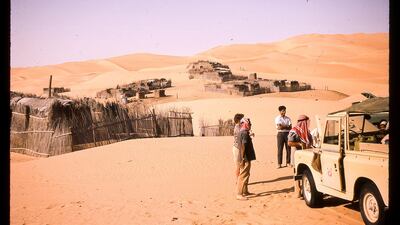A couple of weeks ago, a small gathering took place in London of a dwindling band of men who, between them, played a major role in the history of the UAE in the two decades before the federation was formed in December 1971. The occasion, at which Mansoor Abulhoul, the new UAE ambassador to the UK, was the guest of honour, was the annual reunion of the Trucial Oman Scouts Association.
The TOS, formed in 1951 as the Trucial Oman Levies and later renamed, was a British-Arab force modelled on Jordan's Arab Legion. It served to provide security as the emirates began to move into the modern era, from the early days of oil exploration to the first few years of production and exports.
In 1971, renamed the Union Defence Force, the TOS became the nucleus of the UAE Armed Forces, while individual officers were responsible for the founding of several other key institutions, including the Abu Dhabi Defence Force, the Dubai Defence Force, the Ras Al Khaimah Mobile Force and the Sharjah National Guard, as well as the first formal police force in the country, the Dubai Police, in 1956.
Although in the early days its officers were mainly British with a smattering of Jordanians, the TOS sought from the outset to recruit and train Emiratis, many of whom later became senior UAE officers, such as Sheikh Faisal Al Qasimi, the first Emirati chief of staff of the Abu Dhabi Defence Force, and Abdullah Ali Al Kaabi. Others moved into government or business, playing an important role in the early decades of the federation.
The veteran officers who gathered together in London last month have retained a deep affection for the country they helped create. Many proudly wore the red and white shamagh, or headdress, that had been part of their uniform. Today, nearly half a century later, they deserve credit for laying the foundations of the UAE’s highly professional armed forces.
A number of former TOS officers have written memoirs about their experiences in the Emirates. One of these, A Soldier in Arabia by David Neild, who served in the Scouts and also later founded both the Ras Al Khaimah Mobile Force and the Sharjah National Guard, is widely available in Iocal bookshops.
The National Archives, part of the Ministry of Presidential Affairs, and the Ministry of Defence have both started collecting material on the history of the TOS and other forces. Over the last few years, Athol Yates, a professor at Khalifa University, has undertaken extensive research on this and related topics. His books and academic papers are now beginning to see the light of day.
I feel, though, that there remains plenty of scope for a more dedicated and coherent approach to the collection of data – of all types – about the country’s early military history. The number of surviving British and other non-Emirati veterans of the TOS and other forces like the Abu Dhabi Defence Force and the Dubai Defence Force diminishes year on year. Many veterans have indicated they are willing to collaborate in the recording of this aspect of history.
There are also, of course, Emiratis of the early days of the nation living among us, who have important memories to share and fascinating tales to tell. At a time when all young Emirati men are obliged to undertake national service, surely it is important that attention is given to improving knowledge of the heritage of the country’s armed forces. A pride in the past, an esprit de corps, is certainly an important component in, for example, the US Marine Corps or the British Grenadier Guards.
Two years from now, as the UAE marks its 50th anniversary, it will also be the 70th anniversary of the formation of the Trucial Oman Scouts. That is an anniversary worth marking with equal pomp and ceremony.
Looking further back, perhaps it is time for more attention to be paid not only to bodies like the TOS, which have a direct relevance to our history, but also to the way in which the country has been affected by global conflicts. For example, the UAE was not a major theatre of operations during the Second World War but it was affected by that conflict in a number of ways. A dedicated Dubai-based researcher, Ali Iqbal, has unearthed much information on activities related to the Sharjah base of the Royal Air Force, including the sinking of a German submarine off Fujairah and a number of plane crashes, but more work could certainly be done. These operations were, in some ways, the beginning of military aviation in the emirates. This would, surely, be of interest to those serving in our air force today.
For the moment, however, I am pleased to pay tribute to surviving TOS veterans. Without the efforts of them and their cohorts in the years before the federation, the United Arab Emirates might be a very different place today.
Peter Hellyer is a consultant specialising in the UAE’s history and culture

